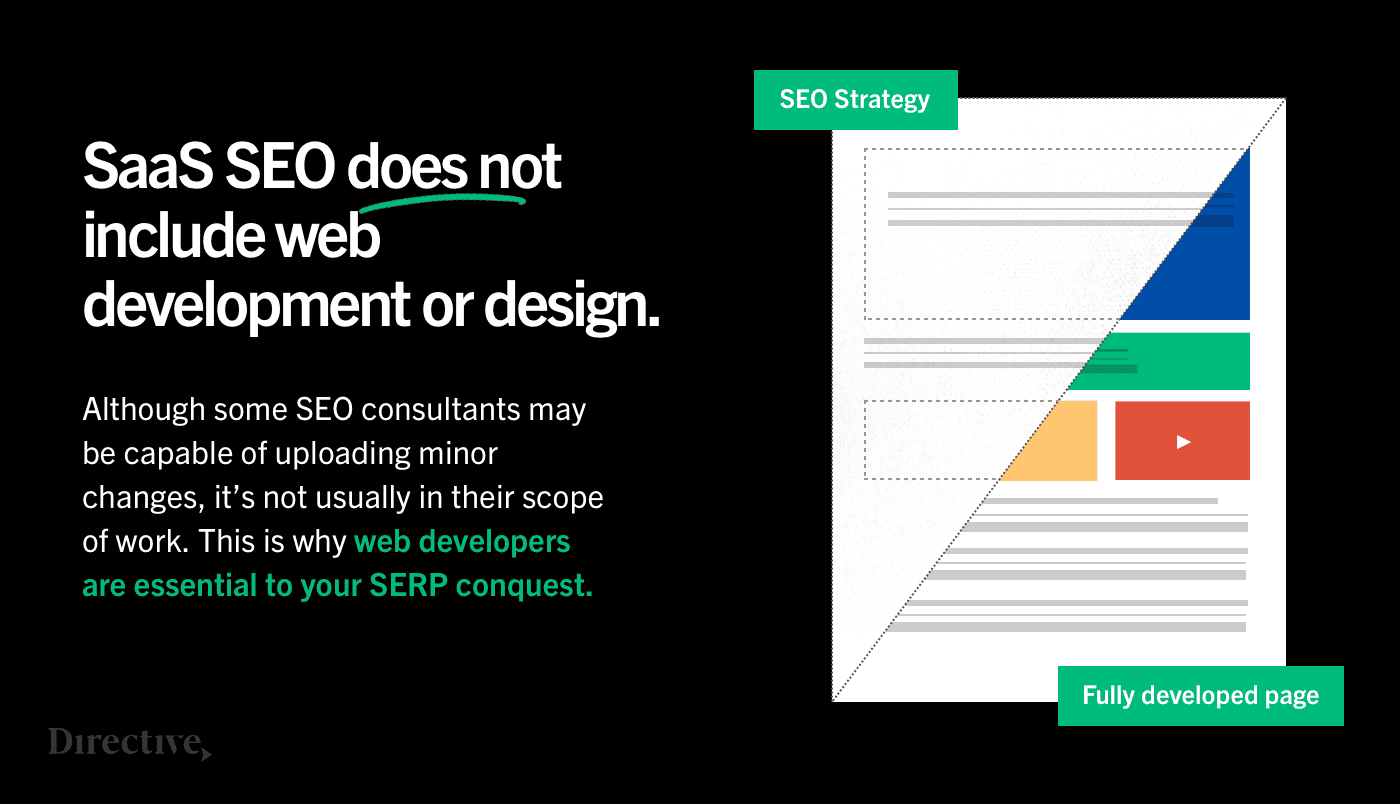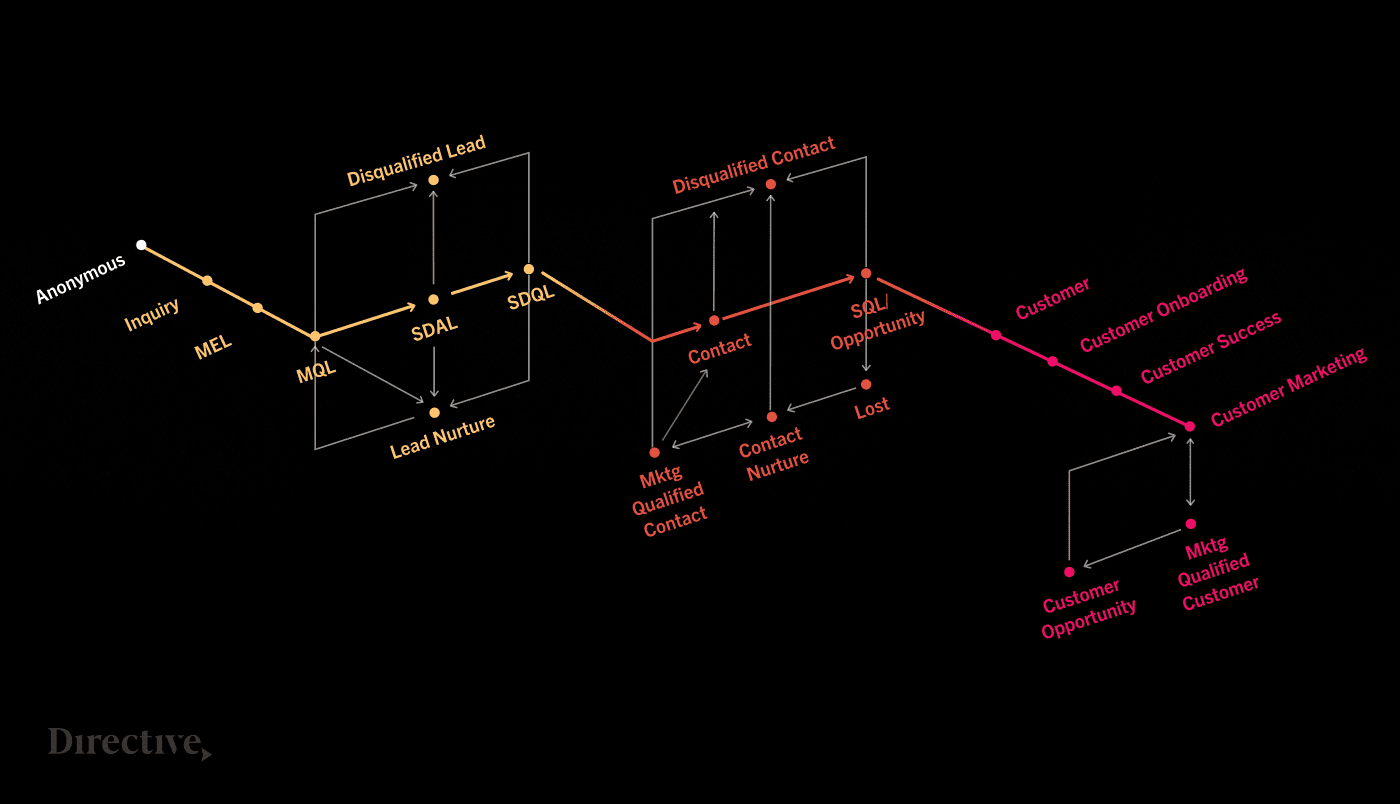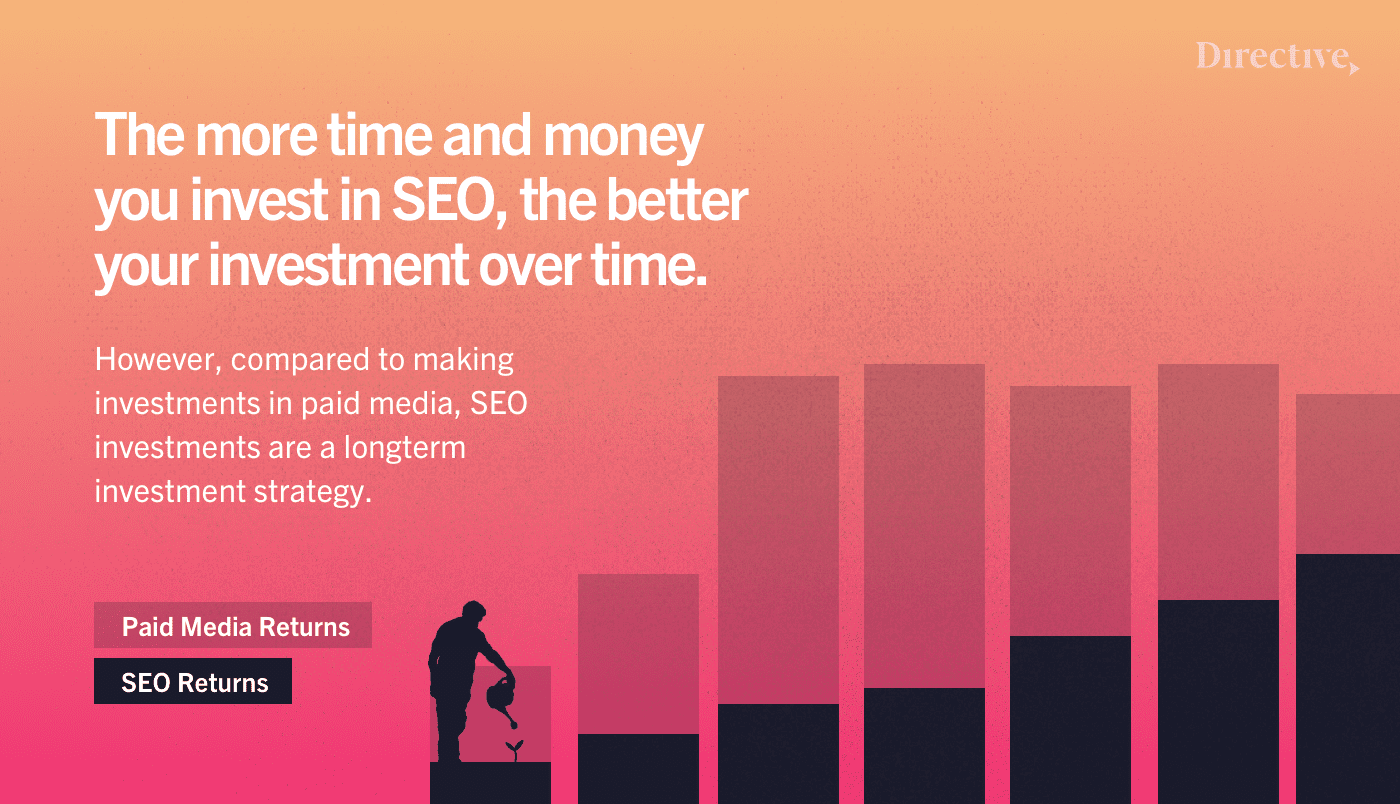Looking for an SEO agency can be a daunting task for any SaaS company looking to scale its business. Unfortunately, while many of these SaaS brands have the right idea in seeking help from qualified SEO professionals, they still have some work to do on their own prior to seeking external help.
Search engine optimization (SEO) requires more than a consultant spewing out recommendations in hopes that their client will implement them. In order for an SEO agency or consultant to be effective in driving bottom-line business revenue for a company, there are prerequisites that must be met.
More often than not, many of these prerequisites are not met which wastes the companies time and money while also frustrating the SEO agency working on the website. In most scenarios, the SEO agency or consultant truly does want to show the value of SEO and the existing partnership. However, with a lack of the following resources, this becomes a Sisyphean task doomed to wasted advertising spend and frustration.
This is not to dissuade anyone from looking for a SaaS SEO agency but rather to bring some items of consideration to the table that will help both parties in their quest for SERP domination. The goal here is to run a genuine internal audit to determine whether or not your brand is currently ready to handle the SEO agency partnership and the work that will follow.
What To Consider Before Hiring a SaaS SEO Agency
As previously mentioned, we as humans have a tendency to place the cart before the horse. In this instance, hiring an SEO agency before internally auditing whether or not your company is ready to take advantage of the SEO services.
SEO is not some light switch that you can turn on or off, it takes time, consistency, discipline, and patience from both the SEO agency and the client. By not properly informing yourself or your company, you could stand to lose thousands of dollars on SEO services that you do not benefit from because your company cannot fully take advantage of them.
In an effort to save your company thousands of dollars, below please find 5 considerations before hiring a SaaS SEO agency.
Search Engine Friendly Website
This should go without saying, but having a search engine-friendly website is an absolute must-have. Make no mistake, an SEO’s job is typically not associated with building a website but properly optimizing it for customers to find.
Yes, an SEO agency or consultant will devise strategies that will include expanding your website’s information architecture but developers are largely responsible for creating a search engine-friendly website. As the “Godfather of SEO” states, it is not an SEO agency’s job to make a pig fly. In other words, paying for SEO services for an unfriendly website is akin to consistently washing a garbage can.
“It is not the job of an SEO to make a Pig fly” – Bruce Clay
SaaS SEO (Typically) Does Not Include Web Development or Web Design
Although there are very technical sides to SEO that require proficiency in HTML, JavaScript, CSS, and more, web development is not typically a part of an SEO service line unless that agency has a development team.
SEO consultants or agencies will provide the work to implement but not always upload it. Although there are many SEO’s capable of navigating and uploading minor changes to various CMS’s, it is not usually within the scope of work.
For this reason, having a qualified and communicative web developer in-house or agency side will be largely beneficial to your overall SEO campaign. The communication between the SEO agency and the web developer is essential to the success of your SERP conquest.

Although a web developer is incredibly vital, it is also important to note that user experience (UX) is a vital component of SaaS SEO. How we design our websites directly impacts how our users will interact with the site. While conversion rate optimization could truly be a service line to itself, SEO consultants and agencies are usually not averse to tactical A/B testing.
With user experience becoming more and more vital within Google’s algorithms, having the ability to pivot page designs based upon heat maps, screen recordings, click depth, or even well-cited case stud ies is becoming more and more important. Additionally, as mentioned above SEOs will often recommend expanding websites information architecture which involves creating net new landing pages that require a design tailored to your ICP and their jobs to be done. We may be in the B2B space, but there are humans on the other side of the screen and it’s our job to create an impactful experience that takes them from apathy to action.
Without the ability to upload the work of the SEO agency or to take their recommendations of expanding your website, refining page speed, or cleaning up technical issues, you’re essentially left with advice that will drive no SQLs or revenue for your business.
Before hiring an SEO agency, be sure to ask if they have their own development team to handle the implementation aspect and if they are well versed with your given CMS. Additionally, if they do not have an internal development team ask for recommendations. In regards to the design team follow the previous steps and be sure to ask for recommendations if the agency you hire does not have an in-house team.
Marketing Attribution and Data Hygiene
Would you drive your car in the dark without turning on your headlights? Well, marketing without proper data hygiene and attribution is nearly impossible. Any SEO or marketer worth their salt will always provide a data-backed solution, strategy, or explanation. However, without trustworthy data and proper attribution, your SEO agency, albeit reluctant, is driving one of your most important brand assets in the dark without lights on.
Would you want your SEO agency or consultant to be unable to tell you the ROI of their service or properly strategize? Probably not, and not so coincidentally, SEO channels will usually have the highest LTV:CAC ratio in comparison to their paid counterparts (there are caveats, keep reading). The ability to demonstrate how marketing is driving revenue is vital to both parties – a cohesive feedback loop here is key.
Marketing operations and revenue operations as a whole seem to be lacking in the SaaS space. Having an understanding of how marketing affects bottom-line revenue is paramount to driving desired business outcomes – after all, marketing is a function of sales.
Far too often SaaS companies are unable to let their SEO agency know how many MQLs or SQLs it took to close one sale, or even be able to get more granular with how many customers per product have been produced by the organic traffic medium. Understanding which products have the highest close rate per MQL/SQL is rather important for allocating both marketings spend and attention.
Additionally, having an average order value is essential to being able to directly tie back marketing efforts to business revenue, thus displaying ROI for SEO (to a degree).
The sad truth is that many Sales teams have little connection with the marketing team. Even more tragic…when operations receive no attention and the leads being driven don’t find their way to the SDR or sales team. Waiting to invest in Operations is costing your organizations millions of dollars in bad funnel management.
“Operations doesn’t get a lot of attention until someone finds out that Contact Us or Demo Request form submissions slide into an abyss and don’t make it over to the SDR or Sales team”. – Drew Smith | Directive
From an analytical perspective, having no data tracking or poor data management in regards to user behavior on a website is simply unacceptable. Typically companies will have some form of tracking (usually Google Analytics) but do not take the time to ensure that data being collected is trustworthy or clean.
If the data collected from your website cannot be trusted by your company or an outside B2B SEO agency, then the strategies and outcomes will not be nearly as optimal as what you’re paying for.
To put the final nails into this coffin – your story is only as good as the data you collect. Would you prefer to tell a tale of ROI with marketing, or a tragic story where an investment was unable to discern any return? This section alone could absolutely make or break your digital marketing campaigns, not just SEO.

Commitment To Content Marketing
Entering the market with nothing new to say is setting your brand up for failure. What’s even worse than saying nothing novel is saying absolutely nothing at all.
One of the major facets of SEO (and there is a myriad of them) is content. SEO is content-driven. If your company wants to rank for specific keywords or a set of topic clusters, the only way to rank is to write.
If your SaaS brand is unable to create net new content, be it a landing page, blog, whitepaper, glossary, or FAQ section then pump the breaks. One of the core components of SEO is searcher task accomplishment, and ensuring we have the answers for our ICP is quintessential to our SEO campaign. This speaks to establishing your brand as an authority but also building a level of trust.
When users see content created specifically for them and their jobs to be done, or pain points, a level of trust is built. Moreover, you’re demonstrating that you’re listening to your customers and their day-to-day struggles. One of the most powerful things we can do as marketers is to listen. Seek first to understand, then to be understood.
Without delving too much into the intricacies of SEO content, many companies are unable to adopt content marketing into their SEO campaign. Why? Well, content is expensive and is an investment in and of itself. When working with larger SaaS companies, creating content is usually arduous, slow, and expensive.
Content demands more resources than just a credentialed writer and SEO agency or SEO consultant. In order to be successful (at scale), resources from Operations, Development, and potentially legal are required. Even finding a skilled writer, whether they be in-house or freelancer, can take time and cost a pretty (but worthy) penny.
Noticing a theme yet? An investment in SaaS SEO is something that will inevitably need to grow internally as well.
Since SEO requires implementation and expansion (development), proper user experience (web design), data hygiene and attribution (operations), and content, it quickly becomes an investment that will grow internally.
Simply hiring an SEO agency will not cover the entirety of the long-term investment of SEO. Although we can calculate the ROI of strictly the SEO service line, it becomes far more difficult when factoring in these additional costs – especially if your data hygiene and attribution are nonexistent or sub-par.
Although SEO requires additional investments, there is one final thing to consider before hiring an SEO agency and it has little to do with any of the previous points.
Relationships Take Two
As the saying goes, “teamwork makes the dream work”. Corny and unoriginal, but annoyingly accurate and poignant.
A constant gripe within the SEO community, especially amongst consultants, is when clients do not heed the recommendations, warnings, or feedback of the seasoned consultant. Granted, no SEO consultant expects every recommendation to be implemented or considered. However, if they do not have the opportunity to speak to their point of contact and explain why X, Y, or Z is important then this is a true waste of time and money.
To reiterate, SaaS SEO clearly requires more than just a consultant which places further emphasis on teamwork especially if you’re looking to scale your business by way of SEO.
For example, imagine your software company had a talented developer, designer, content writer(s), marketing ops team, and SEO consultant. The amount of proper alignment and communication needed to ensure deadlines are hit and deliverables are high quality requires complete cohesion.
Not only do all of the parties need to be well endowed with knowledge, but they need to be able to work effectively together to achieve the desired outcome set by the team and client.
Although many SaaS companies have all their ducks in a row, communication is the Achilles heel to their SEO campaigns. It is simply not enough to have all the necessary roles for your company – they need to be able to work effectively together.
The issue then becomes creating or supporting the creation of an environment where all the roles coalesce to make things happen. Oftentimes, the SEO consultant will be meeting with the design, development, content, marketing operations, and clients team to ensure everything is running smoothly from start to finish.
While endless email threads and bi-weekly Zoom meetings seem like they will be sufficient at first, more communication will be needed. Whether this takes the form of Slack or Microsoft Teams or exchanging work numbers, the communication aspect of an SEO campaign amongst various parties requires a lot of time. And, yes, as you guessed it – that time is billable.
“But to see SEO results you need more than SEO investment – SEO relies on product, technology and content. It’s a hybrid, complex domain that is interdependent on other resources, teams and outputs.” – Tom Critchlow
The Undisputed Value of SEO for SaaS brands
Although SEO is far from monolithic, it is an absolute necessity in the current digital environment. Whether we like it or not, the search engines are not going anywhere anytime soon, and marketing will continue to adapt to digital needs.
With the search engine result page becoming more and more saturated, it requires skilled SEO’s to aid various SaaS companies in owning the organic real estate that drives actual business outcomes. Landing on the first page of Google, especially within the top 5 positions, rarely occurs on accident. As the saying goes, “the best place to hide a dead body is on the 2nd page of Google”.
Although many software brands take the Paid Media approach, there are many ways in which SEO and Paid can acquiesce and dominate the search engine result pages together. Unfortunately, many brands want results NOW and SEO is a long-term investment whereas Paid Media requires less initial runway.
Valuing Short Term Investments over Long Term Investments
Candidly, regardless of your preferred medium of choice, either way, your company will be spending a fair amount of change on marketing. Both SEO and Paid Media require investments to be made however, each requires different forms of investment as previously discussed.

SEO requires internal investment whereas Paid Media (for the most part) requires investment into the Ads populating the first page of Google or your LinkedIn inbox.
Although SaaS brands ultimately “pay” to be on the first page of Google, the way in which each medium accomplishes this task is drastically different. For example, bidding on keyword words and various match types allows for Paid Media to quickly place ads for the given terms on the first page of Google. SEO, on the other hand, requires a lot more time and effort to end up on the TOP of the first page of Google. This is where the common analogy of a Long term investment (SEO) vs. a Short Term investment (Paid Media) comes from.
While both mediums are valuable to driving desired business results, it is important to think about SEO campaigns like a 401k. The more time and money you have invested into it, the better your return on investment over time. Similar to a 401k however, if you withdraw your funds early, you lose a lot of that investment. SEO requires continuous work to see the results whereas Paid Media does require continuous work, but the first-page placement happens far quicker.
Why (When) You Should Hire a Qualified SaaS SEO Agency
Many SaaS companies work with SEO agencies without all the previously mentioned considerations fulfilled. The only issue is that these shortcomings will need to be addressed during the campaign which can slow the overall flow but is not absolutely necessary to begin working with a SaaS SEO agency. To reiterate, the goal was to try and help frame the investment of SEO and demonstrate what other aspects of the SEO campaign are often overlooked from a pricing perspective.
With that said, working with a qualified SaaS SEO agency has numerous benefits to enhancing your brand’s organic visibility. Aside from necessary industry and professional credentials, you’re essentially signing on additional teammates whose primary goal is to help you succeed in your SEO. These SEO consultants take the necessary time to research your industry, competitors, niche, positioning, ICP, and current standings to synthesize an SEO strategy that is worthy of your time and money.
Although SEO is a necessary investment, it is an investment that requires additional internal inputs to operate at its maximum capacity. To learn more about how our SaaS SEO agency can optimize those internal inputs and your SEO campaign, contact Directive Consulting today!
-
CEO Garrett Mehrguth
Did you enjoy this article?
Share it with someone!

